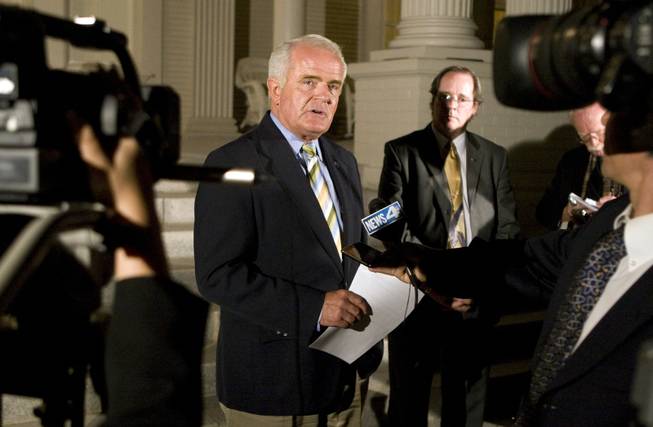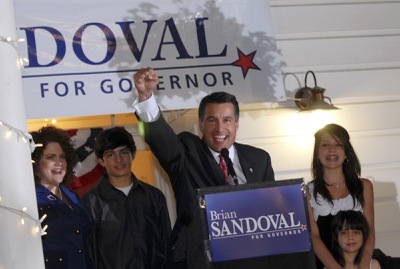
Cathleen Allison / AP
Gov. Jim Gibbons concedes the election Tuesday night from the steps of the Governor’s Mansion in Carson City. Gibbons is the first incumbent governor in Nevada in a century to lose a nominating election.
Wednesday, June 9, 2010 | 2 a.m.

Former federal judge and gubernatorial candidate Brian Sandoval celebrates his victory over incumbent Gov. Jim Gibbons in the party primary at the Garden Shop Nursery in Reno on Tuesday, June, 8, 2010. Standing by during his acceptance speech is his wife, Kathleen, and children, James, Maddie, and Marisa.
Primary results
Reader poll
Related Stories
- Sharron Angle wins; Harry Reid gets race he wanted
- Brian Sandoval the favorite now, but he trails in money race
- What are the take-aways from Tuesday’s primary, especially on the Republican side?
- Sharron Angle vows to ‘take back’ Harry Reid’s Senate seat
- Gibbons vows to work with new governor
- Democrats celebrate election wins in low-key races
- County commission candidates move forward amid budget crunch
- Brian Sandoval defeats Gov. Jim Gibbons: ‘We did it’
Sun coverage
Gov. Jim Gibbons, whose 42-month tenure has been one of near constant adversity, saw his political career end with a whimper Tuesday, as Republican voters roundly rejected his bid for a second term.
Gibbons, whose public service began as a fighter pilot in the treacherous skies over Vietnam, was elected governor just as Nevada was about to enter the worst economic crisis in its history. His tenure was marked by a principled stand against most tax increases, but also a tabloid personal life, an endless stream of gaffes and questionable appointments, and a lack of engagement even as the economic crisis worsened.
“I am humbled and grateful for the four years the people of the state of Nevada have given me as governor and I am proud of the work we all did,” he said during a gracious concession speech that carried a note of relief.
Nevadans — from blackjack dealers to the minority leader of the state Senate to former state employees and retirees — reacted at times with empathy but also expressions of disappointment and outrage about Gibbons, and nearly all of them called him a failure.
“Here’s a guy with really bad timing,” said Eric Herzik, chairman of UNR’s political science department and a Republican.
“He’ll be remembered for sticking to what he believed in, but I don’t think that’s what the times called for,” said state Sen. Bill Raggio, the long-serving Republican leader who backed Gibbons’ opponent Brian Sandoval, who was beating Gibbons by a wide margin late Tuesday.
Guy Rocha, the retired state archivist known for his deep knowledge of Nevada history, was blunt: “Hands down, he will be remembered by historians as our worst governor.”
Gibbons’ nearly seven months as a lame-duck governor will be the longest in state history.
Rocha noted that since Nevada adopted the primary system in 1910, no governor has lost one. Just as significant, Gibbons, a Reno conservative, was ideologically in step with his party’s voters, who proved themselves plenty conservative Tuesday.
His defeat was caused by something else altogether. Cathie Morrone, a blackjack dealer on the Strip and lifelong Republican, echoed comments of other voters: “Jim Gibbons is an embarrassment.”
Gibbons, a former assemblyman and five-term congressman, was coasting on his way to the Governor’s Mansion in 2006 when he suddenly hit multiple crises. He was accused of assaulting a woman in a parking garage after drinking with her at a bar; a woman said she was an illegal immigrant who worked for Gibbons; and The Wall Street Journal detailed his friendship with a defense contractor who gave Gibbons $90,000 in campaign contributions and took Gibbons and his wife, Dawn, on a luxury cruise while successfully lobbying him for a lucrative defense appropriation.
An intensely private man suspicious of even those in his inner circle, Gibbons walled himself off, shunning even his closest advisers as he began his tenure.
“From then on, his administration never recovered,” Herzik said.
The home foreclosure crisis took on its full power in 2007. Construction stopped. Layoffs began. Tax receipts plummeted.
Gibbons’ response, as it would be through his entire tenure, was to cut — across the board — Nevada’s government, already one of the leanest in the country.
For Rocha, the state archivist, the warning signs were there even before the election: Rocha asked him what he thought of the state library and archives. Gibbons replied that they were inessential and would be cut if revenue declined. For Rocha, it was troubling that someone who appeared to hold government in contempt would lead it.
Later, Gibbons followed through on his promise, even as his staff availed themselves of the research conducted by Rocha and his staff. Rocha retired in late 2008, uninterested, he said, in dismantling what he built over three decades.
Even ideological fellow travelers have been disappointed. Geoffrey Lawrence, a fiscal analyst with the conservative Nevada Policy Research Institute, acknowledged that Gibbons has shrunk government, but said he was disappointed that he didn’t take a strategic approach to doing so or introduce more innovative conservative governing policies in the mold of Indiana Gov. Mitch Daniels.
In spring 2008, Gibbons’ marriage began breaking up. Embarrassing details emerged, including the revelation that he had sent hundreds of text messages to a female friend on a state cell phone during the 2007 legislative session. Catching Gibbons in Reno on a date became a popular game.
As the governor’s staff began preparing the budget for the 2009 legislative session, a huge and heartbreaking task given the size of the budget hole, Gibbons withdrew further and only told his staff not to increases taxes. His budget included a dead-on-arrival proposal to cut the Nevada System of Higher Education by 37 percent.
He played a very little role in the 2009 Legislature, which passed a mixture of tax increases and spending cuts over his veto.
For Gibbons’ defenders, his stand against taxes is a point of pride.
“He did everything he could to stop taxes,” said Dan Burns, his spokesman. (Gibbons allowed a significant hotel room tax increase to become law, but said he did so because the voters had approved it in a 2008 ballot advisory question.)
Burns also pointed to Gibbons’ work attracting renewable energy production to Nevada and his creation of the Spending and Government Efficiency Commission. The commission has released three reports detailing ways government can become more effective and efficient, although the recommendations would have almost no effect on the coming budget deficit, which could reach $3 billion by early next year.
Burns also pointed to Gibbons’ recent recommendations to the university system Board of Regents, which would grant universities more autonomy.
Gibbons will go down in history as something of a curiosity who oversaw the beginning of what could become a near decadelong recession in Nevada.
But in one regard he has left an important legacy. He pushed through a constitutional amendment in 1994 and 1996 requiring that all tax increases must pass with two-thirds approval of both houses of the Legislature.
With its ability to shape state fiscal policy, the measure all but guarantees that Nevada will be Gibbons’ Nevada, in perpetuity, for better or worse.

Join the Discussion:
Check this out for a full explanation of our conversion to the LiveFyre commenting system and instructions on how to sign up for an account.
Full comments policy